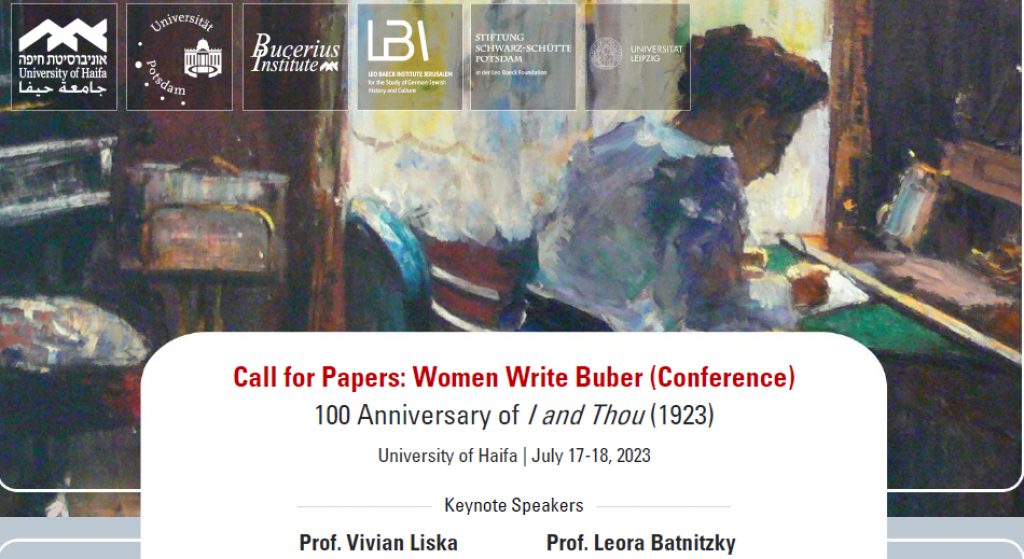
The Bucerius Institute for Research of Contemporary German History and Society , University of Haifa |School of Jewish Theology University of Potsdam |The Leo Baeck Institute Jerusalem for the Study of German Jewish History and Culture |Stiftung Schwarz Schütte Potsdam |University of Leipzig
To view the Bios and the Abstracts
How would I and Thou read if it were written by a woman? Martin Buber was not a feminist thinker, however his philosophy has been occasionally viewed by its virtue of being feminine (Gustav Landauer) while, at other times, insulted as a philosophy for “ladies” (Yeshayahu Leibowitz). Yet, for generations, scholarship on Buber has been dominated by male scholars shaping Buber’s intellectual legacy and the interpretive canon of his works. As in the larger tradition of Jewish thought, women’s experiences, spiritual sensibilities, and intellectual expressions have rarely been acknowledged. At the same time, a new awareness of embodied thinking and positionality necessitates and makes urgent the presence of women’s voices.
The present project invites women scholars to join a conference in Haifa and read Buber from a multiplicity of philosophical and disciplinary perspectives. The presented papers of the conference will be submitted for publication as an edited volume. Our aim is to expand the canon of Buber scholarship and to offer a more inclusive reading of his multifaceted work.
Martin Buber (Vienna 1878 – Jerusalem 1965) was an extraordinarily versatile thinker writing on a variety of disciplines, including philosophy, politics, theology, ethics, education, Hasidism, Bible, translation, religion, sociology, psychology, art, and mysticism. We believe that Buber’s remarkable multiplicity of interest invites a greater diversity of readership. We wish to bring to the forefront the voices of women’s scholarship to reclaim and reinvigorate Martin Buber’s legacy in light of the centenary of his seminal book I and Thou (1922/23).
By offering perspectives from women, our conference seeks to introduce new ways of reading and new approaches to Buber’s legacy, providing greater diversity and giving more attention to neglected voices. In this way, our conference will increase the visibility of women scholars from different cultural, religious, social, and ethnic backgrounds.
We invite women scholars identifying with feminist discourses at any stage of their academic careers to submit papers on every possible aspect of Buber’s thought. Please send us your proposals (350 words) and a short bio by June 23, 2022. To the following email address: womenwritebuber@gmail.com
The conference is scheduled to take place in Haifa, from July 17-18, 2023. We will cover up to one night of accommodation for Israeli participants, up to two nights for European participants, and up to three nights for transatlantic travelers. Need-based travel stipends may be available.
We are looking forward to receiving your proposals!
Conference Organizers
Yemima Hadad (University of Leipzig) holds the Juniorprofessur für Judaistik at the University of Leipzig. Dr. Hadad teaches Modern Jewish Thought, German-Jewish Philosophy, and Talmud. She is a research Fellow at the Bucerius Institute for Research of German Contemporary History and Society at the University of Haifa. Her research interests focus on Political Theology, Continental Philosophy, Feminism and 20th-Century Jewish Thought. She is currently working on a book on the weak God in Jewish sources and modern Philosophy.
Ronen Pinkas (University of Potsdam) is a research fellow at the School of Jewish Theology at Potsdam University. Dr. Pinkas specializes in modern Jewish philosophy, Judaism and psychoanalysis, comparative theology, and has published works on Hermann Cohen, Franz Rosenzweig, Freud, and Erich Fromm.

